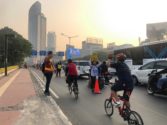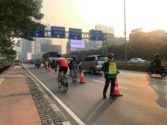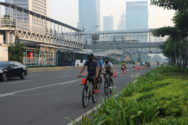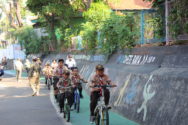 The (ongoing) new protected bike lane in Jalan Sudirman in Jakarta.
The (ongoing) new protected bike lane in Jalan Sudirman in Jakarta.
August 20, 2021
Bicycles: The Future Mode for Traffic Choked Jakarta
Jakarta has signed on to ITDP’s Cycling Cities Campaign, which brings together cities, NGOs, and other partners to make cycling a safe and affordable transportation option worldwide. Cycling Cities aims to identify and build on ambitious cycling efforts, like making temporary cycle lanes implemented during the COVID-19 pandemic permanent, to ensure more people choose cycling.
No single event in modern times has had a larger global impact than theCOVID-19 pandemic. It has disrupted our lives, exposed our inequalities, and altered our use of space within our cities. However, 2020 was the greatest year for cycling in decades.
Global demand for cycling exploded over the past year, and many are proclaiming the bicycle as the future of urban transportation. Cycling is inexpensive, versatile, and the original zero-carbon transport mode. Without cars clogging the streets, people have been able to reclaim space. In many parts of Jakarta, cycling ridership has significantly increased since the enforcement of partial lockdown policies.
Permanent:
Temporary:
From Traffic-Choked to Cycle-Friendly
In the past few decades, Indonesia has centered motor vehicles when planning and developing transportation policies. This has created vast, and extreme traffic and pollution problems. Not only do Jakartans spend 1.5 – 3 hours commuting each way, but over 50% of Jakarta’s pollution is caused by transportation. Indonesia suffers from poor air quality, which can be fatal to residents.
ITDP Indonesia, alongside local partners like Bike2Work Indonesia (B2W), has been working closely with the City of Jakarta to design a 500km cycle lane network and deploy campaigns to expand access to cycling as a way to reduce congestion and improve air quality. Some of these initiatives focus on groups which may not have great access to cycling: like school students, or women. Earlier this year, ITDP and B2W collaborated with the Ministry of Transportation and the Ministry of Public Works and Public Housing to hold a Workshop on the Implementation of the National Cycle Lanes where 30 Indonesian cities received hands-on training, building their capacity to plan and install bicycle lanes in their cities.
Throughout the past year, Jakarta implemented pop-up protected cycle lanes as one of the strategic responses to the COVID-19 pandemic. Many of the lanes brought cyclists to the streets where they had never been before; in some cases, cyclist counts rose by 1000% compared to pre-pandemic. An online survey and field interview conducted after the implementation of pop-up cycle lanes suggest that many people are willing to cycle to commute, even longer distances, up to 11 km if the cycling infrastructure is built properly. In early 2021, the Provincial government committed to making the pop-up lanes permanent protected cycle lanes. This decision was met with enthusiasm from citizens and policymakers alike. A survey, conducted by ITDP Indonesia, of pop-up lane cyclists indicated that a protected or segregated cycle lane was the most requested facility and, relatedly, that unmaintained roads, aggressive drivers, and high vehicle speeds were top concerns.
However, Jakarta’s journey in becoming a cycle-friendly city has been no easy feat. Earlier this year, the enthusiasm from both policymakers and citizens for the protected cycle lane was challenged by a statement issued, in an attempt to revoke the rights of the many cyclists, indicating that the protected cycle lane would be demolished, with police agreeing to it. This statement received heavy backlash from the general public and experts alike.
Although the buzz surrounding the demolition issue has died down, other issues continue to challenge its construction. During the current partial lockdown, the police banned cyclists from passing the protected cycle lane. The police claimed that recreational cyclists would cause crowding. However, based on ITDP Indonesia’s survey, the road is used by cyclists with many different needs, including the vulnerable groups. The cycle lane has reaffirmed the reality that safe and comfortable bicycle lanes are needed by people of all abilities and needs.
Traffic related incidents have risen and an increased number of traffic incidents involving private cars have been reported. Based on a traffic speed survey conducted by ITDP Indonesia in May, the average car speed on Jalan Sudirman was 65.3km/h, significantly higher than the designated limit of 50km/h. Without enforcement of the speed limit, cyclists are left in danger by quickly passing cars. Creating a cycle lane that is protected is crucial to guaranteeing the safety of cyclists.
Protected cycle lanes, in creating safety for cyclists, encourage more types of people to hop onto bicycles. For instance, an increase in protected cycle lanes in Jakarta would generate more cycling among women, who make up only 12% of cyclists in Jakarta. Cycling and bike share offer first and last mile connections with public transport, especially when well connected to transit stations. By giving people an alternative to motor vehicles, cycling offers a pollution free mode of transport.
A Pathway Forward
ITDP Indonesia has called for the Provincial government to maintain its commitment to facilities and infrastructure that ensures safety, security, and comfort for cyclists. This includes moving forward with the installation of cycle lanes in line with the 2019 plan, evolving and expanding the bike share program, and coordinating campaigns and events, like the recent city-led “bike share to work” campaign,” to encourage bicycle use.
If Jakarta is to become a true Cycling City, there must be a true recognition of cyclists and their right to travel safely. This means ensuring that laws and regulations, as well as infrastructure, prioritize the safety and security of cyclists. The construction of protected bicycle lanes is a critical step toward this future.








